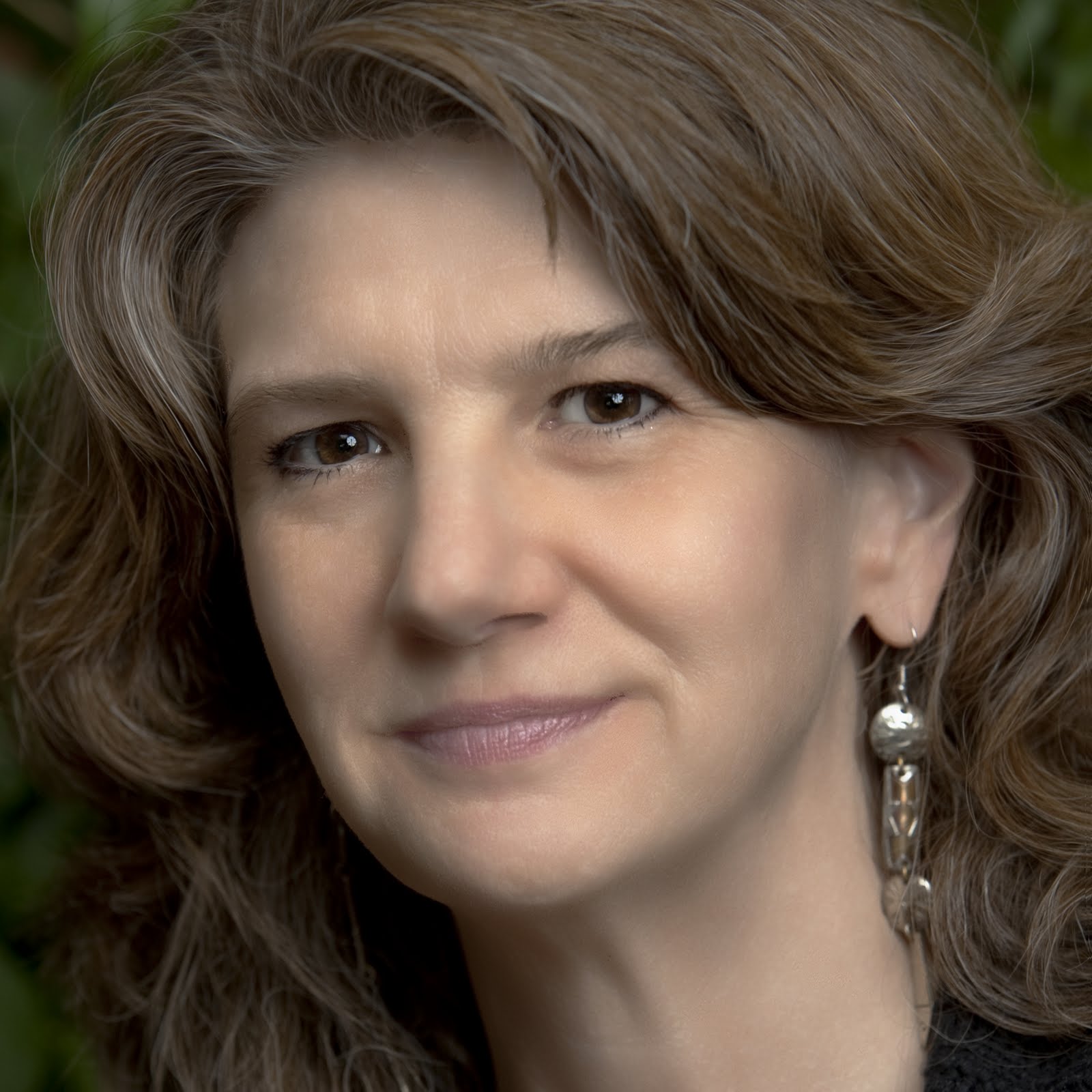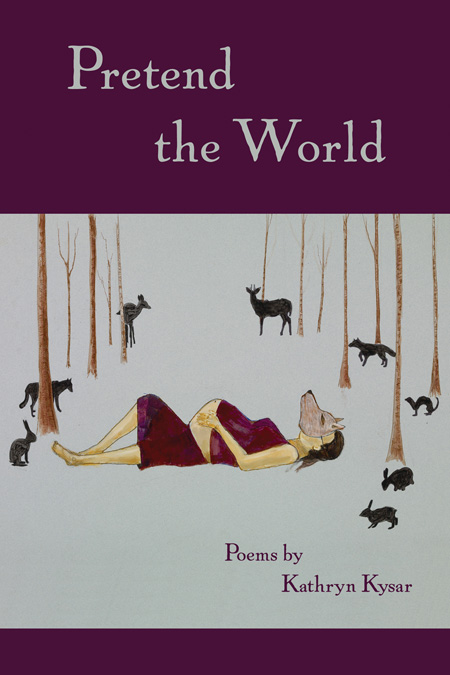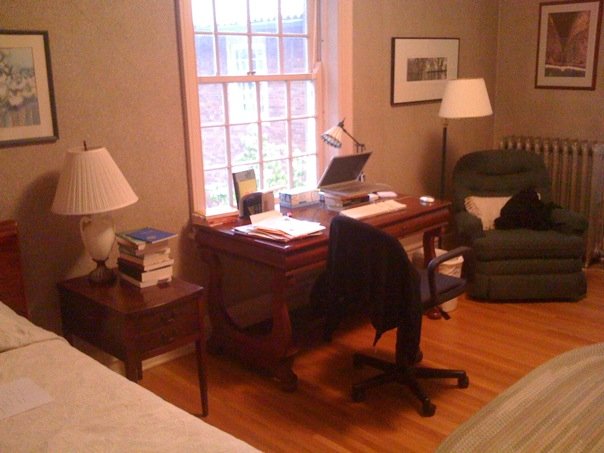The Family Business: Running Away from Home
Poet Kathryn Kysar writes eloquently about the 21st century juggle of creative work and motherhood in this essay about running away from home, the need for peeling away the responsibilities of domesticity, layer by layer, to reveal the artist within.





A recalcitrant, cupboard-slamming teenager sulks in my kitchen, blasting hard rock into his ear buds while eating his third snack of the afternoon, tortilla chip crumbs flying around the table. His exuberant younger sister shares her every action—“and now I am folding the paper crane’s neck!”– from the coffee-table-turned-art-studio as I sit at the dining room table, trying to write.
Before I had children, I lived in a large third-floor apartment overlooking the trees and lights on Hennepin Avenue. When I needed to work on a project, I simply changed the message on the answering machine and gave up cooking and cleaning for a week. But now, in my charming St. Paul bungalow, something is always in disrepair, in need of my attention–the garden, the laundry, the mismatched Tupperware, the outgrown winter clothes—as well as the two kids.
I have always been a creative writing sprinter, a poetry manuscript-binger. Some people can slowly and steadily put in a few hours a day, but I work best with a deadline and a few empty days alone with my laptop. My brain cannot easily follow a complex creative thread with multiple interruptions. I need to be able to let my mind amble, freed from worry about what to make for dinner in 45 minutes or that email I should send to my child’s teacher sometime today. I write best when I can be still, thoroughly immersed in my thoughts. This doesn’t easily happen at home.
I tried renting an office, a room of my own. I shared the space with a wonderful woman, but the office was hot in the summer, cold in the winter, and spooky at night. The packing up, parking, and unpacking consumed so much of my precious writing time. When I was finally seated at the writing studio’s desk, my teaching and household to-do lists persistently nattered away in my mind, hard to silence.
When my children were little, I feared I would never write again. I asked successful women writers how they wrote when their children were small: Often the answer was “I don’t remember,” or, worse yet, “After my partner went to work, the kids got on the school bus, and the day stretched before me…” It was a local poet/novelist/professor who said the magic words: “Run away from home.” She told me she would get a hotel room a few miles away from her house, or go to a local bed and breakfast for 48 hours and write in binges. She said this was how she completed several novels.
I received a month-long residency at the Anderson Center for Interdisciplinary Studies in Red Wing, which meant working out an elaborate child care schedule. I went home about every five days, but when I was at the Anderson Center, I lived by myself in a glorious room with two walls of sunny windows overlooking the road and surrounding lawns. A chef cooked dinner for the residents every night, and if we wanted something from the grocery store, we could just tell her., and she would pick it up for us. It took the first week to silence my mental nattering; I thought deeply about my life the second week, and by weeks three and four, I found could write, really write, easily and with focus and skill. It was as if my domestic life had to be peeled from me to reveal the writer.
It took the first week to silence my mental nattering; I thought deeply about my life the second week. But by weeks three and four, I found could write, really write, easily and with focus and skill. It was as if my domestic life had to be peeled from me to reveal the writer.
Most of my female visual artist friends chose not to have children; they said it would be impossible to make art and care for kids. But women writers seem to fool themselves into thinking they can easily create both art and people; perhaps that’s because we think we do not need studios to do our work. Before we have children, it is easy to entertain the fantasy that we will simply write at home, industrious while our future children take long daily naps. There is a picture of me at my baby shower, pretending to type on computer while wearing a wraparound pillow, demonstrating how I could write and nurse at the same time. That baby cried every night from 5 to 11 p.m., and I never slept more than two hours at a time for seven months. My brain was slow and foggy throughout her infancy; creating good writing was just not possible.
One smart woman writer friend wrote very slowly for many years after she became a parent, patiently spending a decade to write a novel. But then, once her children were grown, she spent her summers in rented offices where she would binge-write 12 hours a day, while her husband graciously handled the cooking and household chores. Finally, now that long-deserved success has found her, she has built a shed in her back yard, desk and day bed side-by-side, a nod to the need to let her mind rest and wander, as well as work. Now, she can away from home across her yard.
I have, at last, found a wonderful place where I can be alone, letting my mind to wind around poems rather than grocery lists. It is a “spirituality farm” run by some very hip Franciscan sisters at an affordable retreat center an hour outside of the Twin Cities. The sisters provide meals and occasional conversation, and I stay in a small cabin where I can read, drink tea, spread my poems on the floor, and write. Relieved of caring for others or preparing my meals, I am able to focus totally on my writing, and, when lacking inspiration, to wander the forest and meadow on the grounds.
On the morning after I returned home from my most recent writing retreat there, I washed the dishes, served breakfast, washed the dishes again, drove the kids to the fencing club, attended a coach/parent meeting, drove home, cooked lunch, washed the dishes, put in a load of laundry, and then it was 2 p.m. — half the day already over, and I was still wearing the clothes I had slept in. Had I written a poem, drafted an essay, or sent something off for publication? Those tasks would just need to wait until the next time I could run away from home.
About the author: Kathryn Kysar is the author of two books of poetry, Pretend the World and Dark Lake, and the editor of Riding Shotgun: Women Write About Their Mothers. She teaches creative writing, composition, and literature at Anoka-Ramsey Community College and lives with her family in St. Paul.